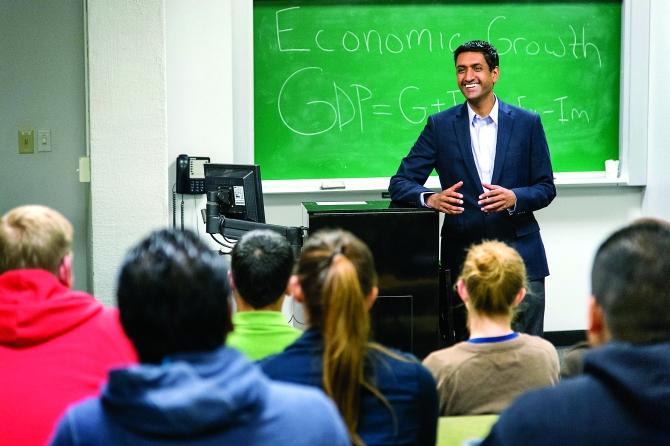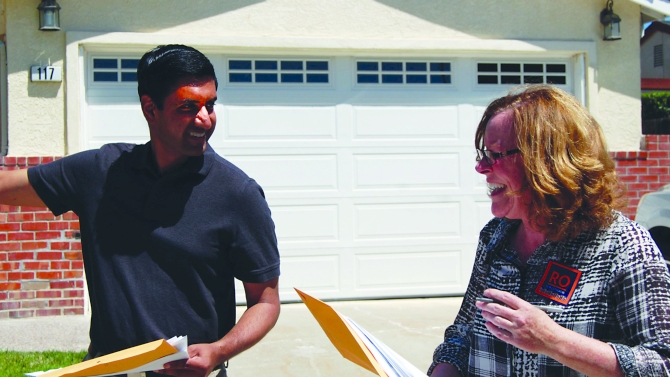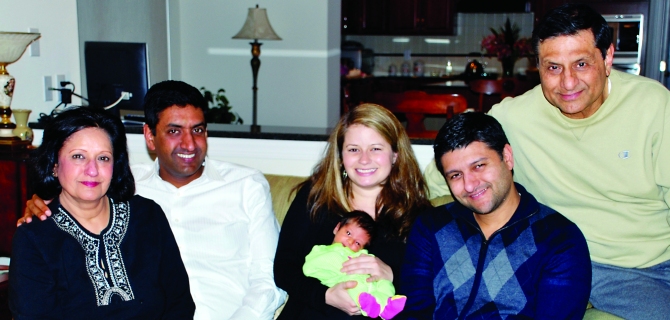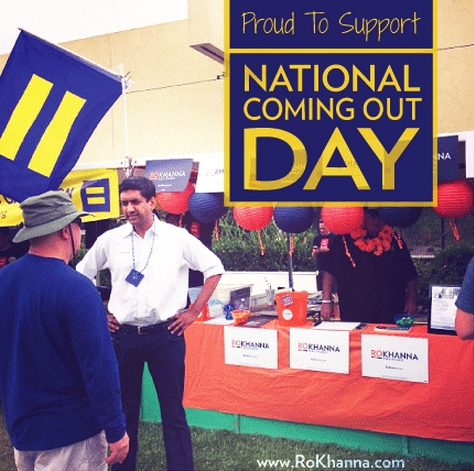Aziz Haniffa
'I will be one of the most impactful players in Washington from day one because of the constituency I represent, which is the greatest, most influential constituency in the country, in the world.'
'The only majority Asian district, with a huge Chinese-American and Indian-American population in a world which is going to be dominated by the United States, China and India -- the heart of the high tech innovation economy.'
Ro Khanna, whose election campaign has America buzzing, speaks to Rediff.com's Aziz Haniffa.
No Indian-American political aspirant -- Piyush 'Bobby' Jindal included -- as far as this correspondent in his nearly three decades of covering United States politics and diplomacy can remember has created the buzz and controversy as has 36-year-old 'Ro' Khanna.
In mounting a primary Congressional challenge to the iconic seven-term Asian American lawmaker Mike Honda, 71, in California's 17th district -- considered the heart and soul of Silicon Valley.
The mainstream media, from The New York Times to the Washington Post, from Time magazine to BusinessWeek, and The Wall Street Journal to Politico, not to mention television and radio, have reported on this primary race (still to get down and dirty) as it has never done before on the candidacy of any Indian-American Congressional candidate -- for that matter any US Congressional candidate.
This is largely because the Democratic establishment from President Barack Obama downwards is solidly behind Honda, while Silicon Valley heavyweights from the Sheryl Sandbergs to the Romesh Wadhwanis and the Vinod Khoslas to the Marissa Mayers are in Khanna’s corner.
Many second-generation Indian-American political activists and lawmakers led by the likes of the only Indian-American member of Congress, Dr Amerish Bera, are backing Honda. They are incensed with Khanna's decision to go up against Honda -- who has always been there with his support and fundraising efforts for any Indian-American Congressional candidate.
Khanna, buoyed by the support for him by the Indian-American community in District 17, is unmoved.
Khanna -- a longtime Bay Area resident who returned to Fremont, California, after a two-year stint serving as deputy assistant secretary at the department of commerce in the Obama administration -- had raised over $1 million even before he officially declared his candidacy April 2 for the primary, not scheduled till May 2014.
According to his camp, he was the 'first non-self-financed challenger to an incumbent to raise seven figures in an out-of-the-gate' quarter.
He has now raised nearly $2 million and counting, which is five times more than Honda's war chest and led to such incessant buzz that the San Francisco Chronicle ran a headline, &'Honda v Khanna: Could Silicon Valley be Ground Zero for 2014 House Asian American Battle Royale?'
A Washington Post blog by Aaron Blake, said Khanna's fundraising numbers were 'nearly unheard of for a House candidate, much less a non-incumbent in a non-election year.'
A blog post on Roll Call -- which reports exclusively on Capitol Hill -- said Khanna's fundraising numbers made him 'Honda's first legitimate primary challenger during Honda's tenure in Congress.'
Politico called Khanna 'the new fundraising powerhouse of the 2014 midterms.'
The Los Angeles Times quoted Larry Gerston, a political science professor at San Jose State University, as saying that Khanna's early fundraising haul demonstrated, 'His seriousness as a candidate and to give the incumbent something to think about, perhaps gracefully retiring.'
Bloomberg Businessweek went as far as saying Khanna's high profile technology donors 'could indicate that Silicon Valley may be ready for a new representative in Congress.'
Adding to the buzz has been the fact that Khanna has hired some political operatives who were part of Obama's re-election campaign, raising the perception that this gives him a distinct edge in strategising.
Honda's endorsements from President Obama and other Democratic Party heavies on the other hand, sources say, "is a clear indication that he's running scared."
A Silicon Valley insider told Rediff.com, that considering that Khanna has the support of more than 80 percent of the Silicon Valley high-tech constituency, "it would do well for Congressman Honda instead of the endorsements by President Obama, Nancy Pelosi (the Minority Leader in the US House of Representatives) and others, gets himself a job in the administration, so that he doesn't have to face the embarrassment of a primary defeat to Ro."
Besides challenging Honda, Khanna is currently a Silicon Valley technology lawyer, a visiting lecturer in economics at Stanford University and adjunct professor of law at Santa ClaraUniversity.
He flew down to Washington, DC recently to sit down for a no-holds-barred chat with Rediff.com and spoke not like a candidate, but like a winner.
Kindly click NEXT to read the interview...
'I could offer some new perspective in the public domain'
Image: Ro Khanna canvassing in Silicon Valley.Aziz Haniffa
Why did you decide to run for Congress? You could have easily stuck in out in the administration and perhaps gotten an even more senior position in President Obama's second term. Why quit?
Moreover, why take on an established Asian American iconic incumbent, who has been a mentor to all Indian-American Congressional candidates?
I loved my time in the administration and I had the opportunity to learn a lot working with business, with manufacturers, about what our country needs to do to be competitive in a global economy.
I was working on a book (Entrepreneurial Nation: Why Manufacturing is Still Key to America's Future) and I felt the ideas about how to grow the economy and be competitive in the 21st century were absent in Congress. I wanted to get my ideas out. So, partly, I left to publish the book.
When I got back to Silicon Valley and started showing the draft of the book, the agenda in there resonated -- what we need to do for upgrading our skills in education, what we need to do for tax reform, what we need to do for regulatory simplification, how we have to embrace the global economy.
That led to me to believe that I could offer some new perspective in the public domain.
Then, of course, the lines all got re-drawn in California and you had a district where the heart of Silicon Valley, the heart of innovation for the nation (resides)...
It was in my mind a confluence between a district that was the heart of Silicon Valley, the issues of innovation and competitiveness that I cared about.
I thought this is the place that I can represent and make a mark in the country and for the world.
Was the book a strategic step? Were you contemplating it while serving in the administration?
It was honestly an organic thing. I kept visiting businesses and manufacturers and hearing these inspiring stories about how they were still making things in the US or competing -- the stereotype is that all of the advanced manufacturing has gone offshore or that American entrepreneurship is stagnating -- and I said here are all these counter-examples.
I started keeping in my mind, a sort of track of all these stories and I wanted to share them.
It emerged, out of all these visits and all those stories. That's what really what became the theme of the book. Then at the end, I draw these policy conclusions. But it was really inspired by my travel across the country -- I felt like I really got to understand America in the job.
I remember slamming you in an opinion piece, saying you had been misled by some Indian-American Silicon Valley honchos who had helped you raise loads of money.
You lost badly then, but resurrected yourself in the eyes of this establishment. Besides being mentored by California Congressman Tom Lantos himself, you had the support of the likes of House Minority leader Nancy Pelosi, who, along with several others, strongly recommended you for the senior position in the Obama administration.
This time around many of them wouldn't have minded you challenging Pete Stark in the primary last year, but you refrained even though at the time you had a hefty campaign war chest. Why?
First, let me talk about the Lantos challenge. It was a four-month campaign. I announced in October of 2003 to run in a March 2004 primary. If Lantos was in Alaska, I would have gone there to challenge him because it was about standing up against the war and standing up against the Patriot Act.
I believe that run earned me the respect of people like Lantos himself and the Democratic leadership because they saw a young person willing to stand up for his beliefs running the first anti-war campaign in the country.
This was probably one of the things I am proudest of in my public service career.
In my judgment, that (showed) to the Democratic leaders that I was someone who was going to stand up for human rights and what I believe in.
After that, I was fortunate because of the graciousness of Lantos and Pelosi to build a lot of relationships.
I moved back (to Silicon Valley) at the end of 2011 and explored when these lines got re-drawn the option of running in a Fremont-based district.
The majority of Fremont was drawn in the district where I am now running; that is where the majority of the South-Asian American population is. It is where the heart of Silicon Valley is. I always wanted to run from that district.
Yes, there was a suggestion that Stark may retire and that may be one option, and I looked at that. But that district, which is Livermore, Tri-Valley, Dublin, is really not where the heart of Silicon Valley is nor is it the heart of the South-Asian community.
Instinctively, I did not think that was the place I wanted to represent.
This is a place where my skills, my background, my heart is fully in representing this district. To me, this is the right place for me to be representing.
By challenging another iconic Democratic lawmaker you have again created a lot of angst among the Democratic establishment, including Pelosi and others who have all joined President Obama in endorsing Honda.
Kindly ...
'I am proud of my heritage and faith'
Image: Ro Khanna, second from left, with his parents, brother and his family.Aziz Haniffa
Was it worth for you to anger the party establishment again, even the White House?
How do you expect to prevail when the entire political establishment in the party is essentially backing Honda?
I have great respect for President Obama and Democratic leader Nancy Pelosi, but these political endorsements don't really matter in Congressional races. I mean, they all endorsed Stark (who lost in the primary).
I have not had a single leader to their credit ask me not to run. They have all understood that democracy is based on competition that competition makes us better.
I was talking about the Democratic establishment -- the hierarchy of the establishment.
If I were running from Washington, DC, it would be a problem, but I am running from Silicon Valley and the establishment in the district is quite split.
We have quite a few of the mayors, we have quite a few of the City Council members, we have quite a few of the State Assembly members supporting me, and we have a lot of people staying neutral.
So, that is the district that I aspire to represent and where I have built a decade of activism.
I have no doubt that if the election was in Washington, DC, I would not prevail. But I don't know Washington, DC. My opponent knows DC.
I know my community and there we have had overwhelming support.
The majority of Indian-American political activists and those who have been supported by Honda -- including Ami Bera, Ashwin Madia (who ran for Congress in 2008), Manan Trivedi (Democratic nominee for Pennsylvania's 6th Congressional district in the 2010 and 2012 elections), Upendra Chivukula (serving in the New Jersey General Assembly) -- strongly back Honda and are upset with you for challenging him.
How do you reconcile all of this? Do you care about what they have been saying about your chutzpah in challenging someone who has been their mentor, supported them and raised funds for them when they ran?
I care about what people in the community think and I have a lot of support from Indian Americans in my district, but also nationally.
The Indian Americans whose support I have are the ones who I admire and respect the most -- people such as Vinod Khosla (venture capitalist), Swadesh Chatterjee (community activist), Deepak Chopra (celebrity New Age guru), Romesh Wadhwani (founder, Symphony Technology Group)... They have been out there advocating for me.
These are the people who built the South Asian community -- who have accomplished and sacrificed far more than any of the politicos you mentioned and who I admire and whose respect means a tremendous amount, people who have been the entrepreneurs in the district.
My grandfather (Amarnath Vidyalankar) spent four years in jail under British colonialism.
I visited India as a young person and I was inspired genuinely by that story.
I speak fluent Hindi, I am proud of my heritage and faith.
That sense of humility and that sense of understanding of historical context, allows me to relate to that first generation in a way that is unique, and they get it that I deeply respect those values and want to take that to enrich this nation.
I believe that is why I have the extraordinary support that I have always enjoyed with that generation across the country.
Do you believe that some of the younger generation such as Ami, Manan, Ashwin and others, and even some in the older generation like Chivukula, for instance, feel a sense of obligation, loyalty and gratitude that makes them stand solidly behind Honda and question your running against someone who they argue has always been there for the community, and for Indian-American candidates who’ve run for Congress, putting his money where his mouth is, raising funds, batting for them in the Democratic Party?
There is a difference of being tactical or strategic.
Some people are tactical about politics, about alliances -- who is there for whom, who is not and so on. That is not how I view politics.
For me, politics is about a currency of ideas.
It was about that when I ran against Lantos, it is about that now.
I have better ideas for how to foster entrepreneurship, how to help our education in the 21st century, what we need to do to embrace the global economy and align with China and India on economic interests, what we need to do to build an alliance of liberal democracies.
For me, politics has always been about a vision of ideas.
I don't like the cocktail circuit; I don't like the chatter; I am not big on the back-scratching
I will never support an Indian American just because they are Indian American. I will support a candidate for excellence.
For me, it is about ideas and excellence and vision and that is what the first generation was about.
They built this country through hard work -- through sweat, blood and tears. Not through back-scratching and political gamesmanship.
I want to take their model of entrepreneurship to a model of political entrepreneurship.
I will not play the traditional Washington game even after I am elected.
I am campaigning on a reform agenda. I am campaigning on a vision and I will be true to that when I come to Washington.
Kindly ...
'We will change Washington politics'
Image: Ro Khanna on the campaign trail.Photographs: Ro Khanna's Web site Aziz Haniffa
Mike Honda's office recently put out a poll that voters overwhelmingly support him over you by 49 to 15 per cent. Do these polls bother you?
The reality is that polls right now are meaningless because we have still not gone on to our message. We have not been on television; we have not been in the mail; we have not had debates; we have not had newspaper endorsements or coverage.
That will happen next year and till then, he has a huge name ID advantage and that is always going to be reflected in the polls, much like you often have in Presidential contests.
You have covered these major races for decades -- people who are 2 or 3 per cent when they started and are unknown, and once the voters get to know them they have to make their choice.
I am confident that once -- based on my conversations in the district -- voters know who I am and what I stand for, they will pick my vision and we will then see how they reflect in the polls.
When they (the polls) will matter is May of next year or October of next year, a month from the election. That is when the polls will matter, but for now, it is kind of an academic exercise. They keep releasing these things and it only shows name ID.
Do you feel the fact they keep putting out endorsements and releasing polls is an indication that the Honda camp is running scared?
I don't think it is scared. I believe it is old politics. Their view of politics is so divorced from the 21stcentury view of politics.
They view politics as putting out polls, getting endorsements, going to traditional groups, running an inside-the-Beltway campaign.
The new generation of politics is about knocking on doors, which I do three to four times a week. It is about going to every community event, it is about being on Facebook, being on Twitter, and earning every voter's confidence at a time of increased cynicism in politics.
Some just have a very, very different vision about what it means to run a 21st century campaign.
I have been inspired by the Barack Obama model -- of community organising, of digital organising, and going into the trenches of the community, while they are running a 20th century, traditional campaign relying on DC insiders and traditional endorsements and polls and consultants to win.
I just don't think that model of politics resonates and it certainly doesn't inspire.
Several Silicon Valley constituents, particularly the techies, acknowledge that they are supporting you -- about 80 percent of them -- and talk of your progressive priorities with regard to manufacturing, growing businesses and the tax report you speak of.
If you are elected, surely they aren't so naive to believe that as a junior freshman lawmaker you can affect change, more so considering that you have gone against the party establishment.
How do you expect to be an effective legislator? Isn't all this idealism, pledges and promises, either naive on your part or simply the usual rhetoric we hear from all those who run promising change?
It is not just the Indian-American community that is supporting me -- it is Sheryl Sandberg (Facebook COO) and Marissa Mayer (Yahoo! CEO) and Sean Parker (Napster co-founder) and Mark Benioff (Sales Force CEO) and a hundred of the top Silicon Valley leaders.
People thought they were naive when they said Facebook could transform the world, people thought they were naive when they said Google would transform the world. They are just awakening and they will change.
We will change Washington politics
Washington has no idea what is coming when people of this calibre and talent and idealism are starting to mobilise. I will go to Washington representing hundreds of these job creators and entrepreneurs that have been responsible for America's innovation and success.
People in Washington will have to listen when I say I am speaking for the people who are responsible for our innovation and job creation.
I will have the backing -- financial backing, intellectual backing -- of some of the leading innovators of our time and that will make me and the district I represent -- that has Apple, Intel, Yahoo!, Google, Cisco, Tesla -- different from almost any other member of Congress, which will make talk of a rookie, junior and freshman Congressman meaningless.
In today's day and age, what matters is not your time in Washington, what matters is what ideas are you standing for, who can you mobilise outside Washington, what is your ability to communicate the message.
I will be one of the most impactful players in Washington from day one because of the constituency I represent, which I honestly believe is the greatest, most influential constituency in the country, in the world.
The only majority Asian district, with a huge Chinese-American and Indian-American population in a world which is going to be dominated by the United States, China and India -- the heart of the high tech innovation economy.
I would have had the overwhelming support of those folks who say, 'This person gets entrepreneurship, he gets what America needs to do, he gets our relationship with Asia,' and people in Washington will listen as is evidenced by the fact that Time magazine, and BusinessWeek, and The Wall Street Journal, and Politico and all of the mainstream publications are covering the race.
When is the last time they have covered a member of Congress, let alone a Senator in this way, and they are not covering it because they are enamored with Ro Khanna, they are enamored by that constituency.
So, if we are generating that kind of national interest, not even having won, imagine the impact we will have, once we win.
This is beyond a race simply for Congress. This is a race to represent the innovation economy, to represent the only Asian majority district in the US, and the Indian-American community.
To represent this district is an extraordinary honor, an extraordinary privilege, and if someone of Indian origin, who are proud of their heritage, happens to be given that privilege, that is an extraordinary moment in the South Asian-American community's political empowerment.
Part 2 of the interview: 'My governing philosophy is closer to where Obama's is'





article